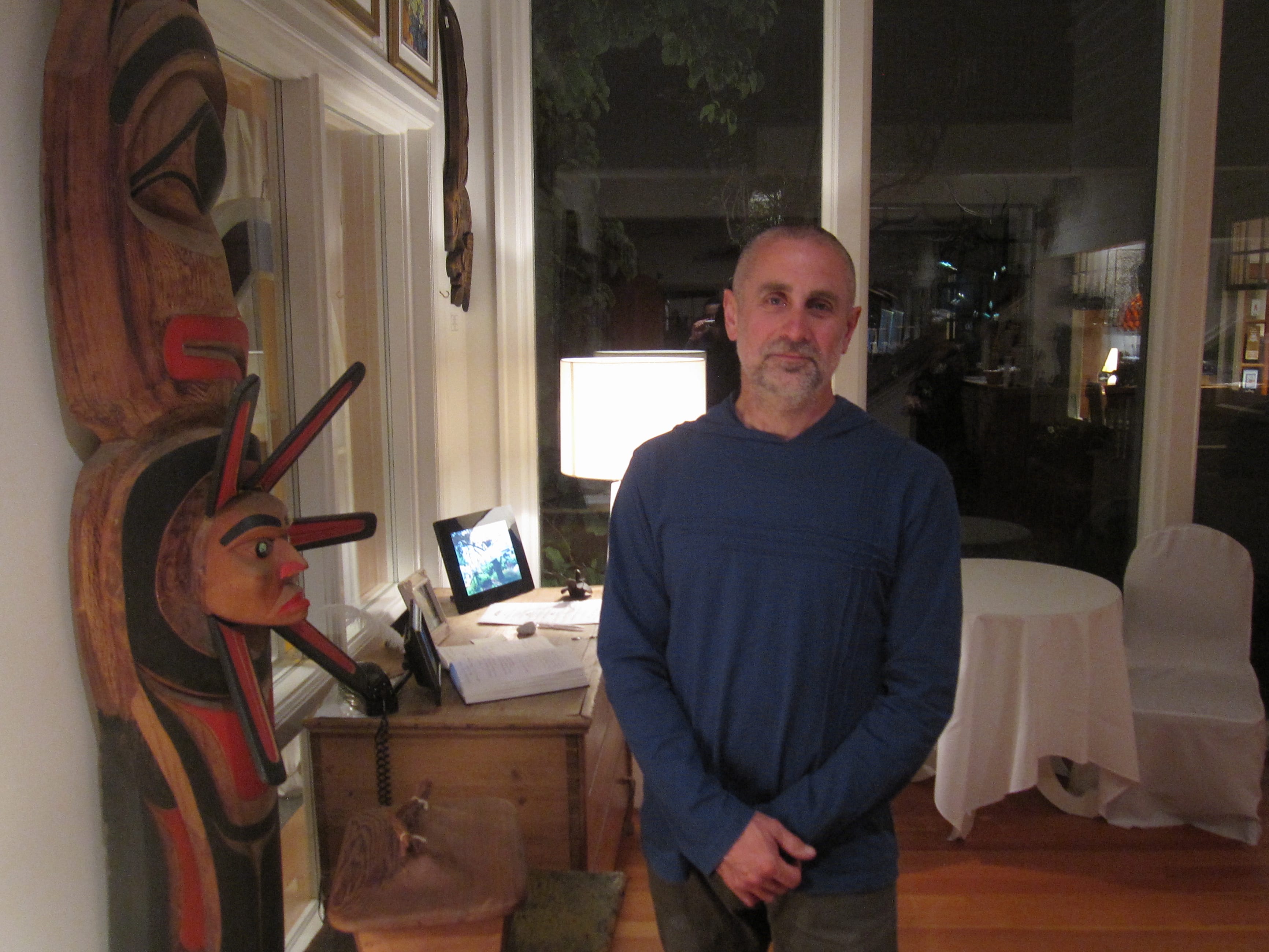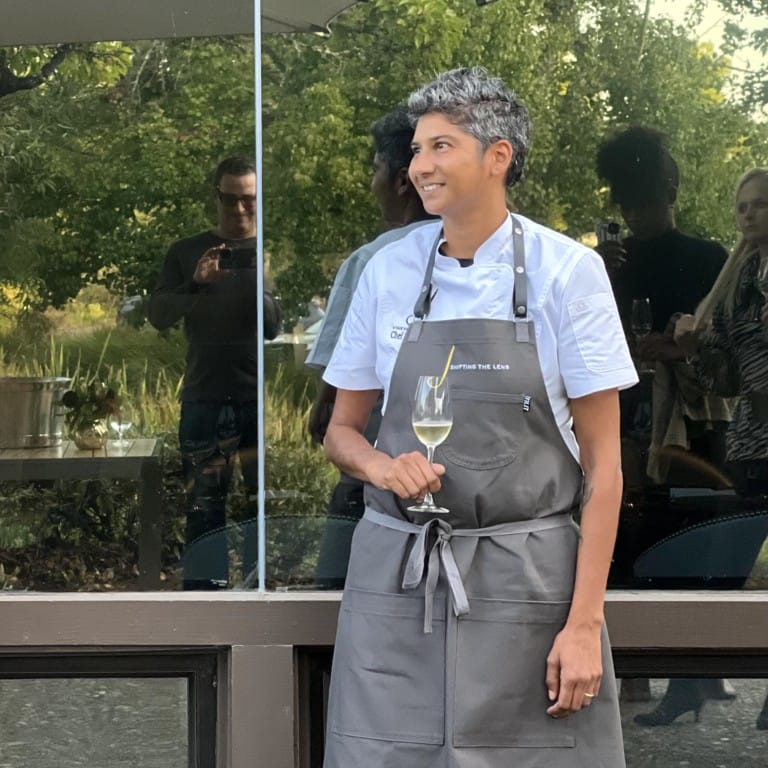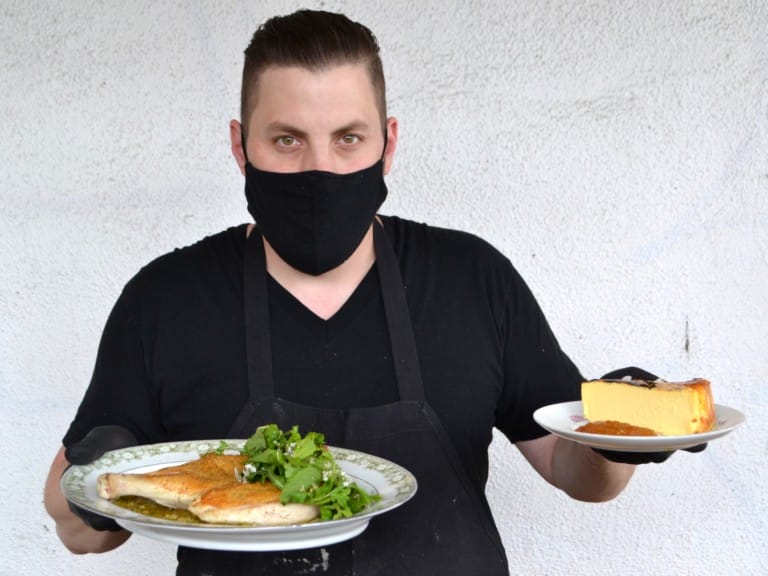Seasoned beekeeper Bob Liptrot drew on ancient traditions to start fermenting mead professionally in 2003, partnering with Dana LeComte on Tugwell Creek Honey Farm & Meadery. Their farm is named for the area’s founding family and located not far from Tugwell Creek on Vancouver Island. They currently make eight different varieties of mead, ranging from Harvest Melomel, a fruit mead that incorporates marion, logan and gooseberries, to fortified Vintage Sac. He recently joined me and Sooke Harbour House co-owner Frederique Philip for dessert, where we sipped Vintage Sac and Liptrot better explained his background and approach.
Why mead?
Well, mead for us has been a big passion. I’ve been making it for over 30 years, and it’s always been a passion of mine because it’s connected so closely with beekeeping. It’s the first alcoholic beverage that has been discovered by humans on the planet. It dates back easily over 10,000 years, and probably longer. I was at a cultural history museum in Montreal last week, and it was a fascinating exhibit on the history of wine and how the Romans had moved northward in their conquest of the Gallic empire, and the hills of northern France and Germany and throughout the tribal lands, and replaced the wine they were using with Roman wine, Mediterranean wine. They were pushing the cultivation of grapes, but prior to that, they were drinking mead a lot. It was very fascinating to see the historical perspective on alcohol. A big part of my interest in making mead is not just the making of it, but the history of it, the fascination of how it crosses over to many different cultures around the world. Almost every culture on our planet has been touched with mead at some point or another. It may not be the main beverage, but there is still is evidence of it in most cultures.
How long ago did you start the company?
We started the company about seven, eight years ago. We’ve really had the idea to always have a honey farm, right from the beginning, when we moved out here 13 or so years ago.
Where did you move from?
We moved from Vancouver. Both Dana and myself were born and raised in Vancouver. We’re those rare people who were born and raised on the West Coast here. We decided that Vancouver was getting a little too big and too crowded for us, and wanted to move someplace a little quieter, a little slower, and we decided to move to Sooke, and have had no regrets.
Frederique Philip: And Dana started working with us.
Liptrot: Yeah. I stayed back and started the farm, got things going and worked on the farm. Dana’s background is in marketing and design, and has a degree from Ryerson University. She was looking for a little more of a challenge than putting fence posts in, so she decided to come over and work for Sooke Harbour House.
Frederique Philip: The only place to work in Sooke.
Liptrot: Yes, that’s right. Well, certainly the best place.
What were you doing for a living leading up to this?
I had a job where I was running quality assurance programs for a company called Mountain Equipment Co-op, which is a little like the American equivalent of REI, Recreational Equipment Incorporated, an outdoor, mountaineering type of store…Prior to that, I was working up north. I’d kept bees for quite a long time. I’ve been around bees since I was a young child, so I was working up north before I moved back to Vancouver to complete my degree. Prior to that, I was working with Outward Bound.
What was your first mead encounter?
My first mead encounter was probably back at university, like a lot of people. At family dinners, too, we got mead, when people used to bring interesting wines to dinner. We also used to make it at university. It’s not quite as refined as what it’s like now.
Have you made other types of alcoholic beverages before?
Oh yeah. I’ve always enjoyed making wine. I’ve made ale as well, but mead has been my passion.
How many different types of mead do you make?
Currently about eight.
What are the differences?
They’re made in the wine style, they’re made most often to be enjoyed with a menu, paired with food. Some are enjoyed on their own, but I enjoy pairing food, because I also enjoy quality food. We have mead in a wine style that is very dry, so suitable for the main course of the meal, all the way up to very sweet dessert courses, and everything in between. It’s quite a versatile product, and we try to even make some lighter styles of mead you can use for barbecues, picnics or sipping.
What’s the range of alcohol by volume?
Our range is from about 10 1/2, which is our Harvest Melomel, the lightest style we make, which is a fruit mead – we always use the same three berries – marion, logan and gooseberry. It’s the lightest alcohol content. It goes on up to about 18% with our Vintage Sac, our fortified mead. That’s actually what I was working on this morning, one component of it, which is a special mead that we produce for distillation purposes at Victoria Spirits, or if we can’t fit our timing with Victoria Spirits, we sometimes use Merridale Cidery, which is a very similar still. We’re quite fussy about how we produce the alcohol. It would be far easier for us just to buy a 45-gallon drum of alcohol from liquor distribution and do it that way, but we wanted to have something like a high brandy. We wanted some presence, we wanted some flavors and aromatics, and you can’t get that from a 45-gallon drum of grain alcohol. That’s what sets that particular mead apart, that and the fact that it’s an old, historic recipe dating back to the Tudor period. No sulfites as well, so for people with sulfite sensitivity, it’s made completely without sulfites.
What are a couple of the food pairings that you really like?
With that one, my favorite way to enjoy the Vintage Sac is poured over homemade vanilla ice cream. It’s wonderful. It’s quite simple, but it’s a nice way of doing it. If you want something a little more elegant, I know Dana enjoys crème brulee, she likes to pair it with crème brulee.
Some of our other meads, the Harvest Melomel, the lighter one, is a wonderful mead for the West Coast during salmon season. It’s great for salmon barbecues. Just a tremendous mead product. We also sometimes make the mead even lighter by adding tonic water or soda water to it, or a twist of lime, and make a nice light spritzer from it. We’ll go the opposite direction sometimes and make a Melomel martini, add some vodka to it and maybe an olive.
Do you have a tasting room?
We do. We have a tasting room that’s open to the public from noon to 5, Wednesday through Sunday.
Do you have any mead mentors?
Not too many around here.
Frederique Philip: You were a mentor to other people.
Liptrot: I guess. We were the first meadery in Western Canada to open our doors to the public. I have met some mead makers from other countries. I really enjoy their meads and respect their work. They’ve done some amazing work. There are some good up and coming mead makers in Canada as well. In time, like anything, the industry will mature and understand what’s required of it, and produce some excellent meads. There’s some very nice mead being produced back east right now. We enjoyed some Intermiel in Quebec when we were there. It’s a very popular beverage in Quebec. It seems like every little township has its preferred meadery.
Any chance to collaborate with another meadery?
Occasionally we do. There’s not much going on right now because they all seem fairly competitive with each other. We’ve tried to put the word out there to have a mead festival, try to get people interested in having a mead festival. There’s a meadery that’s just started up in the Okanagan, a large commercial meadery, and they seem quite open to it. The problem is that everybody’s so busy, and the distances are so vast, it’s difficult to know where to run it and when to run it. It might happen. We’re getting closer to it. We’re optimistic.
Frederique Philip: A lot of people still don’t know what mead is.
Liptrot: Mmm-hmm.
Do you source all the honey from your farm?
Yeah, pretty much. We occasionally go off the farm to source honey, from other beekeepers if we feel that their product is up to it and is interesting for mead. Beekeepers harvest a lot of different honeys in southern Vancouver Island. We have some of the best honey around B.C., I believe, here on southern Vancouver Island. Just like a grape grower who will sometimes go down the road to his neighbors to find a varietal of grapes that they’re not growing, and combine with his own production, to produce an interesting blend, or meritage, they can find lots of varietals in the region. We can find lots of variety of honey in the region too. I’m a big supporter of small beekeepers in the region as well, producing interesting honeys. Our main focus is on natural honeys on the island, because we don’t have a lot of agriculture in this area, not large scale agriculture. We’ve got a lot of tremendous small scale agriculture and small producers, but we don’t have the big 10,000 acre farms with alfalfa, sunflowers or canola, which is fine by me. I’m glad we don’t. We have very diverse habitat and culture out here, and that provides us with very diverse bee forage and honey, and that’s what we focus on, is natural honeys and keeping as far away from pesticides and fertilizers as we can. I think that shows in our finished product, in our mead and in our little jars of honey that we sell to people as well.
Your hives are staying pretty healthy?
For the most part. We have a lot of challenges up here with beekeeping.
What are the biggest challenges around here?
It’s difficult to say, but ultimately, one of the largest challenges is making the people in the Ministry of Agriculture and ultimately the politicians that are running the show, understand the importance of pollination and food security. That’s one of the largest challenges I’ve been facing the last couple of years. I know my way around bees enough to keep my bees alive, and keep them healthy, but to really help other beekeepers do the same thing, you need to have some support.









Leave a Comment